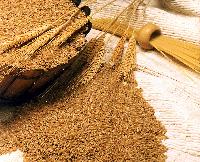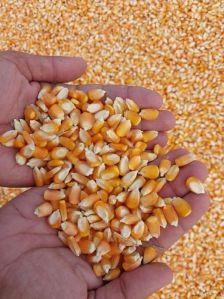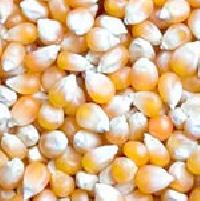
Millet Seeds
Get Price Quote
Since inception, we are involved in selling of premium Millets, as we are its top supplier in the marketplace. We have invested a huge amount in the excellent storage space and shipping facilities. We, with complete ease, entertain voluminous requirements of our respected patrons and uphold entire records and transactions of the products delivered. The Millet Seeds, supplied by us, are known for their high nutrition content.

Wheat Seeds
25 - 200 Per Metric Ton
2150 Quintal (MOQ)
Best Deals from Grain Seeds

Maize
18 - 20 Per Kg
10 Ton (MOQ)

Yellow Maize
Get Price Quote
We are offering yellow maize, maize contains 60 to 68% starch and 7 to 15% protein. Opaque seeded types are more nutrition's and contains a high percentage of essential amino acids. The embryo which forms about 12% of the whole grain is the source of protein, fats and sugars. Yellow maize is the richest sources of vitamin-a. Maize has more riboflavin than wheat or rice and is rich in phosphorous and potash. we are engaged in exporting yellow maize for animal consumption at market leading prices. The yellow maize for animal is carefully processed under the supervision of experts. The product is highly beneficial for the health of animals.

Maize
Get Price Quote
Maize is an annual cereal crop, belonging to the grass family of 'Gramineae'. It composes of kernels having long ears. These kernels are used in the form of grains as food for both humans and animals and also as a source of oil. Maize is also known by the name of 'corn' in many countries. Maize or corn is a rich source of carbohydrates, Vitamin B, proteins and minerals. Most of commercial maize grows at a maximum height of 2.5 ft. In India, maize is also known as 'bhutta' in Hindi. Maize is a type of cereal grain. In countries like United states, Australia and Canada, it is known as corn. It has a nutritional value for both animals and humans. The word maize means “ one that sustains life”. Hybrid maize is one the variety of maize which generally have a high yield level and that is why it is most favored by the farmers. Another varieties of Maize are Sweet corn, Dent corn, Flint corn, Popcorn, Flour corn, Sweet corn and Pod corn. Uses of Maize Maize has a wide variety of uses that ranges from both human to industrial. Maize is used as a livestock, forage or silage for animals. Humans eat maize or corn in the form of popcorn, porridge, beverage, etc. In terms of industrial usage, the grains of the maize are used in the transformation of plastics and fabrics. Ethanol, produced from maize, is being used as an additive in gas to prevent pollution levels and reduce the use of petroleum. Health Benefits of Maize Maize is a rich source of Vitamin B1, Vitamin B5, Vitamin C, dietary fibers, etc. The presence of thiamin in maize helps in keeping the memory power intact, thereby preventing the dreaded "Alzheimer's" disease. Folate, a good source of Vitamin B helps in preventing birth defects and also helps in lowering the level of Homocysteine that has the potential of damaging the blood vessels. Consumption of corn also prevents the occurrence of lung cancer as it is rich in beta-cryptoxanthin, an orange-red carotenoid found in corn in large proportion. Production of maize in India India’s produces around 10-14 million tons of maize annually. This contributes to about 2% of the total world production. Maize in India is generally produced as ‘kharif’ crop, which means that it is usually produced in the summers. Most of the corn produced in India mainly comes from the southern Corn Belt states of Karnataka and Andhra Pradesh. Earlier in 50’s and 60’s, the maize production was improved through crop management techniques and increasing the area under cultivation. Now it is being improved through improvement in yield levels. The Indian states in which maize is produced are: - Main Maize producing states in India Karnataka, AP, Bihar, MP. UP and Rajasthan are the main maize producing areas. It is also produced in Assam, Chhattisgarh, Haryana, Jharkhand, Tamil Nadu, Uttarakhand, Gujarat, HP, Jammu Kashmir, and Orissa. Punjab, West Bengal etc. Expiry rate of maize is fixed according to Nizamabad mandi. Apart from Nizamabad, Karimnagar in AP is also a delivery centre. In Maharashtra, Jalna and Jalgaon are the delivery centres while in Karnataka, Davengere is a delivery centre. Nimbaheda in Rajasthan, Ratlam in MP and Bahraich in UP are the delivery centres which are approved by the NCDEX. Indian maize market Maize as a crop needs a vast variety of environments for production. India as big and an agriculture-oriented country provide all the basic requirements for it. India produces around 10 million ton of maize. Karnataka is the leading producer of maize in India as it falls under the corn belt of India and produces around 15% of India’s total produce. In India, the area on which maize is cultivated is 7 million hectares in 2004. India consumes almost all the maize that it produces. About 50% of the total Indian produce is consumed as poultry feed and about 8% is consumed by the starch industry. Indian maize exports fluctuates around 5 lakh tons annually. Mostly the southwestern countries import maize from India. In another words, India can be considered as maize importing country. Government fixes the quantity of maize to be imported each year and the imports are to be done on 15%.

Pigeon Peas
Get Price Quote
Product Summary: Origin: Many Qty per 20' container: 24 MT Packing: 50 KG PP Bags

Maize
Get Price Quote

Toor (Pigeon Pea)
Get Price Quote
The Pigeon Pea (Cajanus Indicus) originated in the Indian subcontinent. Pigeon Peas are actually a bean. However, they are called peas due to their small size and shape. These beans are about 1/4 round, beige color with light brown speckles. The Pigeon Pea has a pungent flavor and mealy texture. Some color fades after beans have been cooked We import pigeon pea from various countries around the world to India.

Sago Seeds
Get Price Quote
Sago Seeds are also known as Sabudana in Hindi and Javvarishi in Tamil. The Sago Seeds are prepared form milk of tapioca root. The tapioca roots are cleaned in water and peeled. Then, they are crushed to pass the milk powder retaining all fibers. The milk is settled down in the tank for 3 to 8 hours. After the milk is settled, it turns into cake form. The globules from that are manufactured then, using simple indigenous machines. They are sized & filtered by sieve, roasted on hot plates and heated in steam. Then, the Sago Seeds are dried under sunlight. Sago Seeds are available with us in roasted form, known as Sago Common and boiled form, as Nylon Sago.

Maize
Get Price Quote
Soya Bean Seeds, Soya Bean Oil, Soya DOC

Pearl Millet Seeds
Get Price Quote
Pearl Millet Seeds

grain seeds
Get Price Quote
grain seeds, Oil Seeds

Pigeon Pea
Get Price Quote
Pigeon Pea, White Chickpeas, Green Moong, White Chickpeas

Pigeon Pea
Get Price Quote
Pigeon Pea, Arhar Dal, toovar dal, Toor Dal, red lentil pulses, Mung Bean

Yellow Maize
Get Price Quote
soybean granule, Soybean Flour, Sodium Bicarbonate, Maltodextrin Powder

Maize
Get Price Quote
Food Grains, Flour

Barley Seeds
Get Price Quote
Barley Seeds, Bajra Seed, Flour, Soybean Seeds, Sorghum Seed, Sesame Seed

Seeds
Get Price Quote
Seeds, Indian Fresh Vegetables, Copper Winding Wire, Poly Winding Wires

Toor Pigeon Peas
Get Price Quote
Toor Pigeon Peas, Yellow Peas, Red Lentils, Green Lentils

Corn
Get Price Quote
Corn, dollar chana, Pulses, Flour